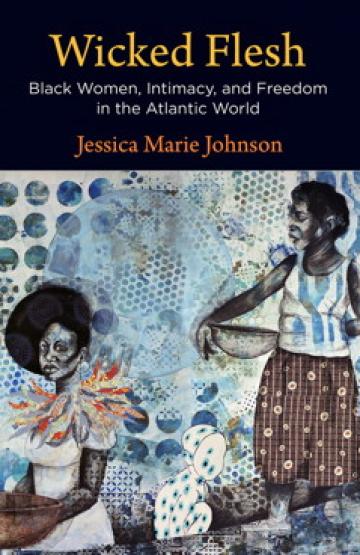Wicked Flesh: Black Women, Intimacy, and Freedom in the Atlantic World
Jessica Marie Johnson
2020
University of Pennsylvania Press
by Jessica Marie Johnson
Winner of the Frank L. and Harriet C. Owsley prize for the best book in southern history, granted by the Southern Historical Association
Winner of the Rosalyn Terborg-Penn Book Prize for Outstanding Original Scholarship on Gender and Sexuality in the African Diaspora, granted by the Association for the Study of the Worldwide African Diaspora
Winner of the Wesley-Logan Prize in African diaspora history, granted by the American Historical Association
Winner of the Lora Romero First Book Prize, granted by the American Studies Association
Winner of the 2020 Kemper and Leila Williams Prize for Louisiana History, granted by The Historic New Orleans Collection and the Louisiana Historical Association
Finalist for the Pauli Murray Book Prize in Black Intellectual History, granted by the African American Intellectual History Society
Honorable mention for the Frederick Jackson Turner Award, granted by the Organization of American Historians
Honorable Mention for the Mary Alice and Philip Boucher Book Prize, granted by the French Colonial Historical Society
Finalist for the 2021 Frederick Douglass Book Prize, granted by the Gilder Lehrman Institute of American History, the Gilder Lehrman Center for the Study of Slavery, Resistance, and Abolition, and the MacMillan Center at Yale University
Honorable Mention for the Barbara Christian Literary Prize, granted by the Caribbean Studies Association
The story of freedom and all of its ambiguities begins with intimate acts steeped in power. It is shaped by the peculiar oppressions faced by African women and women of African descent. And it pivots on the self-conscious choices black women made to retain control over their bodies and selves, their loved ones, and their futures. Slavery's rise in the Americas was institutional, carnal, and reproductive. The intimacy of bondage whet the appetites of slaveowners, traders, and colonial officials with fantasies of domination that trickled into every social relationship—husband and wife, sovereign and subject, master and laborer. Intimacy—corporeal, carnal, quotidian—tied slaves to slaveowners, women of African descent and their children to European and African men. In Wicked Flesh, Jessica Marie Johnson explores the nature of these complicated intimate and kinship ties and how they were used by black women to construct freedom in the Atlantic world.
Johnson draws on archival documents scattered in institutions across three continents, written in multiple languages and largely from the perspective of colonial officials and slave-owning men, to recreate black women's experiences from coastal Senegal to French Saint-Domingue to Spanish Cuba to the swampy outposts of the Gulf Coast. Centering New Orleans as the quintessential site for investigating black women's practices of freedom in the Atlantic world, Wicked Flesh argues that African women and women of African descent endowed free status with meaning through active, aggressive, and sometimes unsuccessful intimate and kinship practices. Their stories, in both their successes and their failures, outline a practice of freedom that laid the groundwork for the emancipation struggles of the nineteenth century and reshaped the New World.


